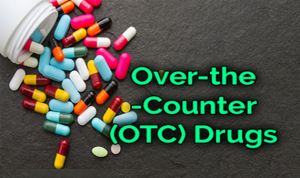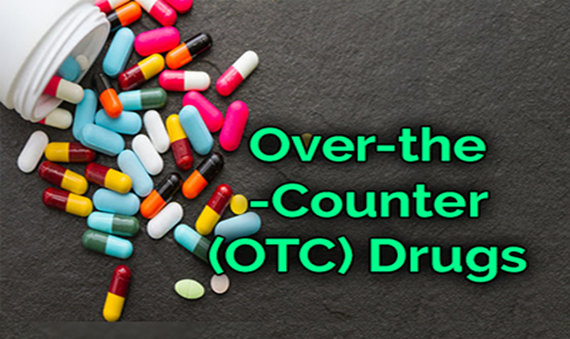Introduction
Drugs/ medications sold at pharmacies without a doctor’s consultation and prescription are called Over-the-Counter (OTC)medicines/pills/medications. OTC pills provide immediate relief from common conditions such as headaches, colds, allergies, and indigestion. Although these drugs are widely available and safe to take when taken as directed, many people inadvertently abuse them by taking larger than necessary dosages or abusing them for longer than necessary without a prescription.

Credit: Lyons
Certain over-the-counter medications contain active components that may be abused when used over approved quantities. Misuse of these medications may result in unintended and perhaps dangerous side effects such as drug dependency and drug toxicity.
This article is aimed at educating you on the risks associated with the abuse of common OTC medications.
Common Over-the-Counter Medications In Nigeria
- Pain relievers (Paracetamol, Ibuprofen, Aspirin)
- Antibiotics (Amoxil, Ampicillin, Ampiclox, Metronidazole)
- Anti- Malaria (Arthemeter-lumefantrine combinations (ACT))
- Antihistamines (for Allergies and Colds)
- Nasal decongestants (Pseudoephedrine, Phenylephrine)
- Antacids (for Heartburn and Indigestion)
- Laxatives (for Constipation)
- Cough Syrups (Containing Dextromethorphan or Codeine)
Side Effects of Abuse of Common Over-the-Counter Drugs
● Analgesics (Painkillers)
Examples include: Aspirin, Paracetamol, and Ibuprofen
Aspirin, ibuprofen, and paracetamol (acetaminophen) are common pain medications that are used to treat inflammation, fever, and pain. When taken as directed, they are usually harmless, but excessive use might have harmful adverse effects.
● Acetaminophen:
Since the liver metabolizes this medication, overuse causes damage to or failure of the liver. This risk is increased by using paracetamol for longer periods or by taking bigger doses than advised. Symptoms of overuse include- nausea, vomiting, jaundice, or yellowing of the skin or eyes, and stomach pain that could be a sign of liver damage.
● Aspirin and Ibuprofen (Non-Steroidal Antiinflammatory Drugs (NSAIDs)):
If taken excessively or for extended periods, both medications have the risk of causing renal damage, gastrointestinal bleeding, and stomach ulcers. Specifically, aspirin can thin the blood, raising the risk of bleeding complications.
● Antibiotics
Examples include Ampicillin, Amoxil, Augmentin, and Metronidazole.
Antibiotics are potent drugs that treat bacterial illnesses. However, research shows using antibiotics improperly or excessively can have detrimental effects, including the development of antibiotic resistance. Antibiotic resistance increases morbidity and death by making infections more difficult to cure.
Other effects of resistance to antibiotics are reduced treatment options (fewer effective antibiotics may be available to treat infections), higher healthcare costs (treating antibiotic-resistant infections often requires more expensive and complex treatments), and increased mortality (treatments caused by antibiotic-resistant bacteria can be more difficult to treat, leading to higher rates of death).
● Antimalarial drugs
Antimalarial drugs are vital for treating and preventing malaria, a dangerous and sometimes fatal illness. They may, however, have adverse effects, just like any drugs. Research shows inappropriate dosage of antimalarial medications can result in treatment failure and the emergence of drug-resistant parasites. Drug resistance may also result from not taking antimalarials for the whole prescribed duration.
Drug-resistant malaria parasites make treating the illness more challenging.
Other serious adverse effects from antimalarial medications include rashes on the skin, nausea, vomiting, diarrhoea, and dizziness. They may also occasionally result in blood problems or liver damage.
● Antihistamines (to treat colds and allergies)
Antihistamines, like diphenhydramine (Benadryl) and chlorpheniramine, are frequently used to relieve congestion brought on by colds, allergies, and itching. However, excessive use can result in adverse symptoms such as drowsiness, dizziness, dry mouth, blurred vision, and disorientation. Memory issues may also result from long-term abuse of sedative antihistamines, particularly in older persons.
Additionally, extended use can lead to dependency causing them to lose part of their potency, necessitating greater dosages to have the same effect, and increasing the chance of an overdose.
● Nasal Decongestants
Examples include: Phenylephrine and pseudoephedrine
Nasal decongestants are used to treat sinusitis, allergies, and cold-related nasal congestion. Although it provides temporary relief, overuse might lead to a spike in blood pressure, anxiety, sleeplessness, vertigo, and palpitations in the heart. Note that, heart-related adverse effects are more likely to occur in people with underlying cardiovascular diseases.
Additionally, rebound congestion is a condition where nasal passages are more clogged after taking nasal spray decongestants for an extended period. This might result in a vicious cycle of usage.
● Antacids (for indigestion and heartburn)
Heartburn and indigestion are frequently treated with antacids and drugs, such as calcium carbonate, magnesium hydroxide, aluminium hydroxide, and proton pump inhibitors (PPIs), such as omeprazole.
Although they work well when used infrequently, using them too often or excessively can cause problems.
● Antacids:
Research shows that magnesium-based antacids may cause diarrhoea, and overuse of calcium-containing antacids can result in kidney stones. Extended usage of antacids containing aluminum may result in constipation and weakening of bones as a result of calcium loss.
● Proton Pump Inhibitors (PPIs):
Research shows long-term PPI use raises the risk of intestinal infections, osteoporosis, and vitamin B12 deficiency. Additionally, long-term use may also raise the risk of kidney disease.
● Laxatives (for constipation)
Laxatives like senna and bisacodyl (Dulcolax) are frequently used to treat constipation.
Although laxatives are useful occasionally, overusing them might result in electrolyte imbalances, dehydration, and dependency—the inability of the body to function normally without bowel movements. Signs of misuse to be aware of include cramping, bloating, and difficulty passing gas without the laxative.
● Cough Syrups (With Codeine or Dextromethorphan)
Dextromethorphan, an opioid, and codeine, a cough suppressant, are common ingredients in cough syrups.
Prevention of OTC Medication Abuse

Credit: Recovery Ways
- Adhere to the shortest term and the lowest effective dose as prescribed by your doctor.
- Rather than taking more medication if the discomfort/pain doesn’t go away, consult a doctor.
- Always take antihistamines as directed by a physician. For long-term care of persistent allergies speak with a physician.
- Apply decongestants for a maximum of three to five days. If symptoms don’t go away get alternate treatment advice from a medical professional.
- Consult a doctor if you have indigestion or heartburn frequently. Naturally modifying your diet and way of life, such as cutting back on spicy foods or eating smaller meals, might help control symptoms.
- Aim for a diet high in fibre (found in fruits, vegetables, and whole grains), drink lots of water, and maintain an active lifestyle for regular bowel health.
- Laxatives should only be taken when prescribed by a doctor and when required.
- Cough syrups should only be used for temporary relief; unless a doctor has prescribed them, stay away from codeine-containing medicines. For an accurate diagnosis and course of therapy for a persistent cough, speak with a medical practitioner.
Conclusion
Overuse/ abuse of over-the-counter drugs can result in dangerous and occasionally fatal side effects, even though they offer quick and efficient relief for many common conditions. It’s important to take these drugs exactly as prescribed, giving special attention to the dosage and duration. Furthermore, it is preferable to consult a doctor rather than self-medicate if symptoms intensify or continue.
At Wellahealth, we empower you to take control of your health by using prescription drugs sensibly and seeking medical advice when necessary. Never forget that taking additional medication can occasionally have the opposite effect of better relief.
To get appropriate medical advice and doctor consultations for as low as #800/month, subscribe to one of our health care plans or send a WhatsApp Message today!
Article written by Dr. Ifeoma M. Uduh (BDS)
Edited by Dr. John Afam-Osemene (MBBS, DA)






